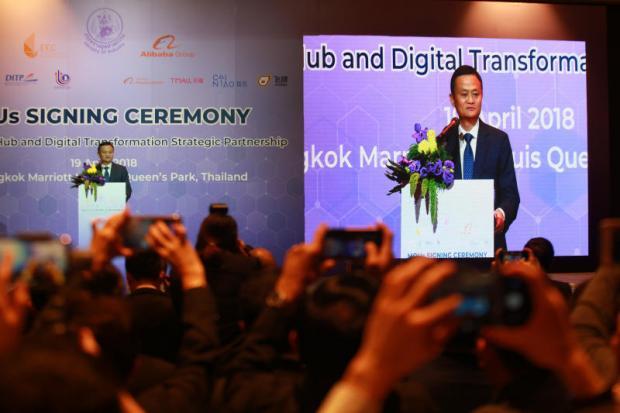Thailand: Workforce needs upgrade to suit Alibaba
Thailand must narrow its education gap and digitise its workforce in order to take full advantage of Alibaba’s planned investment, says Saovaraj Rattanakumfu, a senior researcher at the Thailand Development Research Institute (TDRI).
Alibaba’s Eastern Economic Corridor (EEC) plan and digital development cooperation programme are gaining traction in the days after Jack Ma, executive chairman of the Chinese e-commerce giant, presented a plan to turn Thailand into the region’s digital and e-commerce hub.
Thailand’s key challenge will be digitising its workforce if it wants to perform effectively in this role, Ms Saovaraj said.
There are close to 427 undergraduate STEM courses available at nearly 170 schools nationwide. They collectively produced more than 26,000 graduates in science, technology, engineering and mathematics in 2017.
The problem, however, is the quality of instruction, Ms Saovaraj said: “The courses are outdated because they are not adapted to the rapidly changing technology.”
This educational gap makes investors, including Alibaba, reluctant to invest in high-value-added activities in Thailand.
The only way to invest in Thailand is to distribute products to neighbouring countries, Ms Saovaraj said, adding that Thailand has not benefited much from that kind of investment in the past.
Just like the governments of Singapore, South Korea, Taiwan and Japan, the Thai government must develop high-quality digital manpower by implementing short, intermediate and long-term policies. Thailand must strive to create three types of digital workers.
The first is a group that can develop and use disruptive technologies, such as artificial intelligence, massive data and the Internet of Things. In many countries, the development of this group is undertaken by intensive training programmes of approximately six months that focus on developing skills to apply to real problems.
Taiwan’s Institute of Information and Industry has organised such courses in Singapore, where they were implemented through the Skills Framework for Infocomm Technology project. The training focuses on producing high-quality workers, not necessarily large volumes of them.
The second group is software developers and programmers, built through close relationships between schools and the private sector. A good example of this model is South Korea, where institutions can apply to become ICT Model Schools as long as they fulfil requirements in terms of curriculum and availability of facilities and research equipment.
A committee then selects the top 30 most promising institutions per region, and they receive grants of 45-90 million baht for a four-year project. If the school does not perform satisfactorily in its annual evaluation, it is replaced by a different entity.
The third group is highly skilled people from abroad, used to help alleviate immediate shortages. Singapore, Australia and the US have succeeded with this rubric.
In Thailand, a similar measure was enacted in early 2018 when the government issued the Smart Visa designed for highly skilled professionals. This four-year visa does not require a work permit.
Workers seeking a four-year visa must maintain a minimum wage of 200,000 baht a month. Those who have a salary of more than 100,000 baht but less than 200,000 baht will be able to apply for a two-year visa. The government, however, should consider adjusting the minimum salary, Ms Saovaraj said.
In the long term, Thailand should focus on improving the quality of education by creating a mechanism for the business sector to provide necessary skills to educational institutions and help them tailor the curriculum to their needs.
Companies should provide experts to advise schools, extend their internship programmes and help secure quality teachers. South Korea’s NEXT and Japan’s KOSEN are good examples of this model, Ms Saovaraj said.
“Developing successful digital manpower hinges on four principles: focus on quality, cooperation with the private sector, responsibility creation and accountability,” she said. “A strong push towards these ideals will allow Thailand to reap the full benefits of Alibaba’s investment, and those of other leading companies in the future.”
Source: https://www.bangkokpost.com/business/news/1452674/workforce-needs-upgrade-to-suit-alibaba


 English
English




